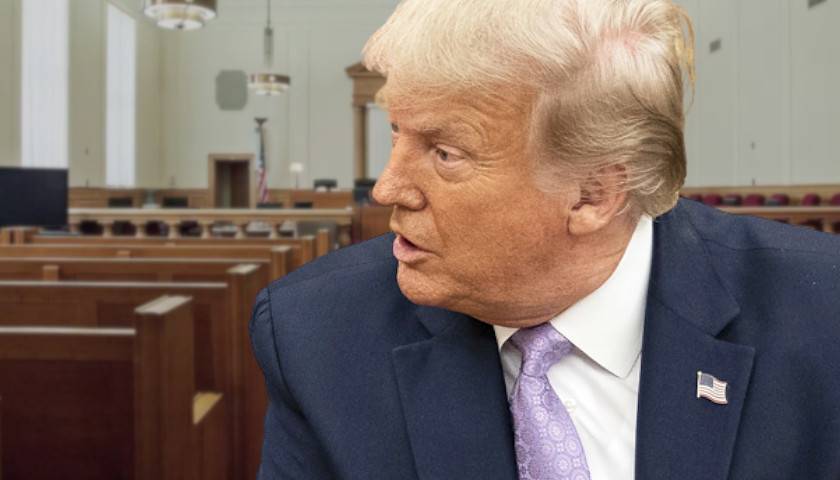by Brett Rowland
A federal judge ordered all the attorneys involved in former President Donald Trump’s classified documents case to move forward with the process to get security clearance.
U.S. District Court Judge Aileen Cannon told all the attorneys to “complete all outstanding applicant tasks required to obtain the requisite security clearances in this matter” by July 13.
Cannon, who was appointed by Trump, previously ordered all the attorneys to begin the process by reporting to the Litigation Security Group of the Department of Justice.
Trump pleaded not guilty to 37 counts that allege he kept sensitive military documents, shared them with people who didn’t have security clearance, and tried to get around the government’s efforts to get them back. He is charged with 31 counts of willful retention of national defense information along with conspiracy to obstruct justice, withholding a document or record, corruptly concealing a document or record, concealing a document in a federal investigation, scheme to conceal and false statements and representations.
Trump remains free on a recognizance bond without travel restrictions. On Thursday, the former president called for sanctions against special counsel Jack Smith and others.
“[Jack Smith,] the DOJ, and the FBI, should be sanctioned for prosecutorial misconduct and Grand Jury Abuse,” Trump posted on his social media platform. “Election Interference!”
The 49-page indictment laid out the charges against Trump and his valet and alleged co-conspirator Walt Nauta. Trump was charged with keeping classified documents after leaving office and later obstructing the government’s efforts to get them back. The indictment contains specific dates and times with to-the-minute details of where the documents were stored, where they were moved, and who was involved.
Among the records were 197 that contained classified markings, including 98 marked “secret” and 30 marked “top secret.” The “top secret” designation means that unauthorized disclosure “reasonably could be expected to cause exceptionally grave damage” to national security,” according to the indictment. Trump turned those records over to the National Archives and Records Administration on Jan. 17, 2022, in response to demands from that federal agency.
On June 3, 2022, an attorney for Trump provided the Federal Bureau of Investigation with 38 additional documents with classified markings. And during a raid of Mar-a-Lago on Aug. 8, 2022, the FBI recovered 102 additional documents with classified markings.
While the U.S. Secret Service provided security to Trump while he was at his Palm Beach property, Trump never told the agency that classified documents were stored there, according to the indictment. Mar-a-Lago hosted 150 social events – such as weddings, fundraisers and movie premieres for tens of thousands of guests from January 2021, when Trump left office, through the FBI raid on Aug. 8, 2022. Mar-a-Lago had about 150 employees during that time, prosecutors said in the indictment.
Prosecutors allege the documents belong to some of the nation’s most secret agencies, including the Central Intelligence Agency, the Department of Defense, the National Security Agency, National Geospatial-Intelligence Agency, National Reconnaissance Office, the Department of Energy and the Department of State.
The documents contained information regarding defense and weapons capabilities of the United States and other allied nations, U.S. nuclear programs, plans for possible retaliation in case of an attack and potential U.S. vulnerabilities, according to the indictment.
Trump stored the boxes in several locations at Mar-a-Lago, his social club with 25 guest rooms in Palm Beach. The boxes that contained classified documents were stored in a ballroom, a bathroom and shower, an office space, his bedroom and a storage room, prosecutors alleged in the indictment.
The club was not authorized to store classified documents.
Prosecutors further alleged that Trump showed classified documents to people not authorized to see such records. In one case on July 21, 2021, at the Bedminster Club in New Jersey, Trump allegedly showed a writer, a publisher and two staff members classified documents. During the recorded interview, Trump said that the documents were “highly classified” and that could have declassified them while president, but could no longer do so after leaving office, according to the indictment. In August or September 2021, prosecutors allege Trump showed a representative of his political action committee a classified map of a country.
Trump is the first president to face felony criminal charges.
In April, Trump pleaded not guilty to 34 felony counts in New York related to charges he paid hush money to adult film star Stormy Daniels through a lawyer before the 2016 presidential election and covered it up as a legal expense before being elected president.
The Litigation Security Group “is a team of security specialists available to be detailed to the Court to serve as Classified Information Security Officers to assist in the handling and protection of classified information. These CISOs serve in a neutral capacity providing advice and assistance to the Court and the parties in the handling of classified information,” according to a U.S. Courts website.
– – –
Brett Rowland is an award-winning journalist who has worked as an editor and reporter in newsrooms in Illinois and Wisconsin. He is an investigative reporter for The Center Square.




